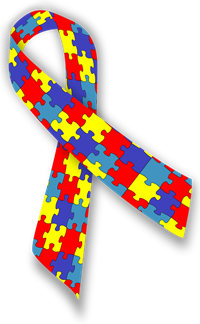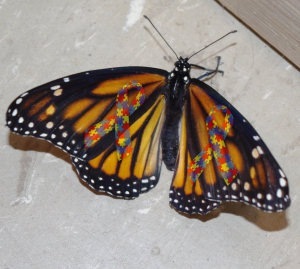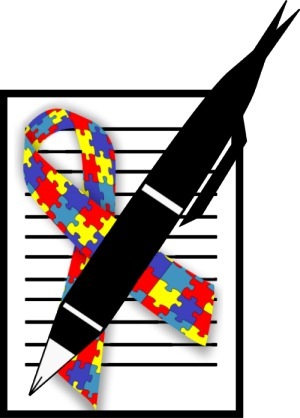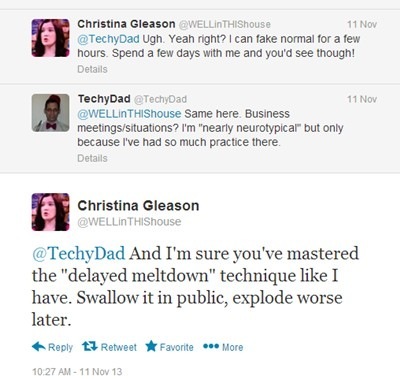 There’s a post that’s making the rounds in the social media world from a mother who blames herself over the fact that her child has Autism. Normally, I’d say that this is normal. Every parent blames themselves over everything that happens to their child. Getting an Autism diagnosis is never easy – even when it winds up helping you understand what is going on with your little one and even though it can help you help them more.
There’s a post that’s making the rounds in the social media world from a mother who blames herself over the fact that her child has Autism. Normally, I’d say that this is normal. Every parent blames themselves over everything that happens to their child. Getting an Autism diagnosis is never easy – even when it winds up helping you understand what is going on with your little one and even though it can help you help them more.
That being said, though, the mother goes through a laundry list of ways that she gave her son Autism. From Ultrasounds to vaccines and High-Fructose corn syrup to C-Sections. Even fluorinated water contributed to his diagnosis. She’s convinced that, had she just avoided each of these things, her son would be "normal." Therefore, it’s all her fault. Right?
Wrong.
Her mistakes aren’t on that laundry list. Instead they involve 1) trusting the wrong sources for medical information, 2) bad risk assessment, and 3) viewing Autism as some debilitating disease which means her child will never have a fulfilling life.
Consider The Source
The good thing about the Internet is that everyone can get the word out about what is important to them. The bad thing about the Internet is that everyone can get the word out about what is important to them. Even if there are no facts to back them up. If you wanted proof that man never walked on the moon, just do a search. I’m sure dozens of sites will be willing to show you "definitive proof" that the astronauts were suspended by wires on a sound stage. This doesn’t mean they are right, of course. Just that they can set up a web page.
On the medical front, there are lots of organizations that make their money by getting people to question "the medical establishment." To listen to them, there are tons of cures for everything from cancer to the common cold, but Big Medicine is keeping them down. But if you just buy their pills/special water/anti-toxin cleanse/etc, you’ll get better in no time. They fall under the umbrella of something called Alternative Medicine.
The problem is that they – for the most part – don’t work. I say "for the most part" because every so often some alternative medicine shows promise in actual medical treatment. When this happens, it moves into mainstream use in some fashion. (Thus leading to a common joke told in groups that bust medical myths: Do you want to know what people call Alternative Medicine that works? Medicine.)
To give an example, suppose that chewing a leaf from a certain plant helped make pain go away. Some might sell the leaves as an alternative to pain medication and it might fall under the heading of "Alternative medicine." However, scientists would study the leaf, isolate the chemical compounds responsible for the pain relief, study it, and make a pill comprised of a safe and reliable dosage of this compound. The alternative medicine would wind up being just medicine.
Yes, drug companies seek out profits and, no, they aren’t saints. However, if some drug company (even a tiny one) actually could cure cancer with a "toxin cleanse" or some other treatment, they would make billions. There are scores of researchers trying to figure out each disease and condition. How does it begin? How does it progress? Can it be slowed down/halted/cured? They release their findings in a public fashion for other scientists to examine and attempt to replicate. Findings that can’t be replicated are ditched and those that can be repeated lead to new theories on how these conditions work. This, in turn, leads to new treatments.
The problem with the conspiracy theory approach is that it requires a large group of people keeping the secret so well that they hide it from the public and yet so poorly that the conspiracy theory group "sees the truth." In the case of the Moon landings, tens of thousands of people supposedly kept quiet about the design and launch of a rocket as well as the training of astronauts over a period of over 40 years. All to keep the illusion that we went to the Moon.
And yet, somehow, these conspiracy theorists have found the truth. The deception needs to be both near-perfect (to explain why the public has fallen for it) and fundamentally flawed (to explain how the conspiracy theorists figured it out) at the same time. Conspiracies might work on a small time or size scale (say, a politician hiding illicit actions for a couple of years or a small group of people keeping a small secret quiet for a decade), but major companies/government organizations keeping secrets involving thousands of people just don’t happen. (The only possible exception might be national security matters and there’s even a case against that if Edward Snowden has proven anything.)
Moving back on topic a bit, I looked through the sources that the blog author linked to. Some claimed certain scientific studies claimed a link to Autism where one might not exist or where the link might exist but might not be causal in nature – that is, X might show increased incidence in kids with Autism not because X causes Autism because of some other factor. Others were from sites built specifically to decry that Medical Item Y is really horrible and causes tons of horrible illnesses. Quite a few touted their own "alternative medicine" or "folk medicine" treatments instead of actual medicine. Most of these sites, I wouldn’t trust as far as I could throw the servers they run on.
Bad Risk Assessment
This one is primarily aimed at the "vaccines cause Autism" cry that the mother echoes. I’ve lost count of how many times I’ve heard this uttered. First off, there is no study proving a link. In fact, no matter how many times this is studied, the results always come back showing no link at all. The main "Autism caused by vaccines" outcry came from a study by Andrew Wakefield who has since been found guilty of misconduct, had his license to practice medicine revoked, and had his study erased from the Medical Registrar.
Secondly, the reasoning behind "vaccines cause Autism" seems to change as the supposed causality is disproven. First, it was mercury in vaccines. When that was removed and Autism went up, it became giving multiple vaccines at once instead of breaking them apart. Then, it was overwhelming the child’s immune system with too many vaccines too quickly. Then, it was mysterious "toxins." (This last one seems to have stuck mainly because you can’t disprove "toxins" if just what the toxin is remains undefined for maximum spooky effect.)
However, let’s assume for a moment that a study came out tomorrow definitively proving that vaccines cause Autism. (For the purposes of argument, we’ll skip the steps where the study would be checked and double-checked with replication attempts being made by many third party scientists.) Would it make sense to stop all vaccinations to halt the "spread" of Autism?
No.
Here’s where Bad Risk Assessment gets involved. Vaccines are victims of their own success. Most people today (and I include myself in this) don’t remember the horrors that many diseases wrought before vaccines were found for them. Many people think that the Measles just involves being sick with spots for a week (ala Chicken Pox) or that Whooping Cough just means you cough a lot. No big problem, right? Except that many people either died or were permanently scarred/disabled by these diseases. If you had a choice between your child having Autism or having a big chance of a horrible death which would you choose? A child with Autism isn’t worse than a dead child. Anyone who thinks so clearly has never lost a child before. I’m sure the parents of Dana McCaffery would have loved to have her alive and Autistic instead of dead at 4 weeks – too young to be vaccinated.
Here is where the big success (and "failure") of vaccines lies: Herd immunity. If you vaccinate 90% of a population against a disease, the disease won’t be able to spread enough to infect the 10% who aren’t vaccinated (usually due to age or medial conditions). This means that those who aren’t vaccinated are protected by the vaccinated.
Now some people decide vaccinations are bad and stop vaccinating. Their kids don’t immediately fall ill as herd immunity is still in play. However, as they spread the word about "evil vaccinations" and as more people stop vaccinating, herd immunity stops working and more people get infected. Three years ago, as part of a post on herd immunity, I wrote a Vaccination Simulation. It’s not perfect, but I still think it’s a good demonstration. Sadly, this is being demonstrated in real-life with the uptick in measles as well as other vaccine preventable diseases.
Of course, nobody put it better than Penn and Teller. This scene from their show Bulls**t shows the issue a lot better than I can. (WARNING: Given that it’s from Penn and Teller’s show "Bulls**t", expect foul language.)
(Side note: For more facts on vaccines and why the anti-vaccination movement is wrong, I’d recommend reading http://antiantivax.flurf.net/.)
Autism Isn’t A Debilitating Disease
Yes, some people with Autism will spend their lives needing constant help with every day matters. However, other people with Autism will go on to lead very productive and fulfilling lives. Some will even excel in their fields. I’ve found my Autistic thought processes lend themselves very nicely to dealing with computers – which is handy considering that I program websites for a living.
I can’t speak for the author’s child. I don’t know the child and every person with Autism is different. The only clue I have is one line that indicates that her child is verbal. That’s about it. This doesn’t give much of an idea of what challenges lie ahead. I can almost guarantee that they aren’t insurmountable, though. Especially given how young her child is. The younger a child with Autism gets help dealing with the neurotypical world, the easier of a time they’ll have.
There are many support groups and therapists available to parents nowadays. These people can help children with Autism navigate their way through a neurotypical world that often seems all too confusing. They can also help neurotypical parents understand their child with Autism.
I’d recommend that the author find a group that doesn’t focus on pointing fingers at what caused her child’s Autism and instead looks to find a way to help her and her child.
How I REALLY Gave My Son Autism
Like I said before, I have Autism – specifically Asperger’s Syndrome. After our son’s diagnosis, we began reading up on Asperger’s Syndrome and everything fit me too well. I always knew I was different but never why. I chose not to get a formal diagnosis mostly because it would cost money we don’t have and it wouldn’t help NHL at all. (I’ve already figured out coping strategies.)
It took me some time to came to terms with the fact that I have Asperger’s Syndrome. It was like my entire life was both being re-written in front of me and yet, at the same time, as if my entire life made sense for the first time. (I think I annoyed B with a few too many "a-ha! THAT’S why I do X" or "THIS explains why I liked doing Y as a child!" exclamations.)
As I came to grips with this, though, I found myself feeling something else. At the time, I called it "Genetic Guilt." You see, all the evidence points to Autism being a genetic issue. Somewhere in our DNA, some genes get flipped one way instead of another way and the result is the Autism spectrum – ranging from high functioning to (for lack of a better word) low functioning. Since I was clearly Autistic, this meant that MY genes gave NHL Autism. Part of me felt that it was MY fault. Of course, I knew intellectually that this wasn’t true, but it took the emotional parts of my brain longer to catch up to the logical parts of my brain.
Modern Day Refrigerator Mom?
In the past, when we knew much less about Autism than we know today, the blame for Autism was placed on mothers. The "Refrigerator Mother Theory" figured that moms who didn’t provide enough "maternal warmth" caused their children to be autistic. While that theory is (thankfully) dead and gone, I don’t think the "blame the parents" attitude ever completely left.
There still seem to be countless people pointing fingers at parents (often softening the blow by claiming they were duped by Government/Doctors/Big Medicine/etc but pointing nonetheless). What’s worse is that many parents seem to accept this pointing with open arms. Perhaps it’s due to the feeling of control they have over a situation that can often feel very out of control. Whatever the reason, though, it’s wrong.
Here’s the truth from one parent with Autism to all parents (Neurotypical and Autistic alike) who have children with Autism: The only way you "gave" your child Autism is via genetics and that’s something you don’t have control over. Accept the "why" and move on. Focus on the child you have. They aren’t some brainless lump with no hopes for a future and they certainly aren’t better off dead. They have their challenges, yes, but they also can have support to help them through. A big part of that support is you. Be there for your child and get support for yourself as well. It isn’t easy (no, not even if your child is "high functioning"), but it is worth it. Blaming yourself and buying into conspiracy theories or Internet rumors about how Autism happens isn’t going to help anyone, least of all your child.
NOTE: The Autism Awareness ribbon icon above was created by Melesse and comes from Wikimedia Commons.
 Today is both Autism Awareness Day and the second day of Autism Awareness Month. Last year, was our first Autism Awareness Day/Month since our diagnosis. This year, we’ve gone from learning how to live with Autism to advocating and helping to spread information about Autism.
Today is both Autism Awareness Day and the second day of Autism Awareness Month. Last year, was our first Autism Awareness Day/Month since our diagnosis. This year, we’ve gone from learning how to live with Autism to advocating and helping to spread information about Autism.

 When you have a child, the instinct to protect your kid from all pain and sorrow is powerful. It gets even stronger if your child has special needs.
When you have a child, the instinct to protect your kid from all pain and sorrow is powerful. It gets even stronger if your child has special needs. This was originally written as an e-mail to some relatives of mine who cast doubt on NHL’s diagnosis of Asperger’s given how "well behaved" he acted and how much "Internet research" they did concerning Asperger’s Syndrome. (Of course, if Internet research made someone an expert in a field, I’d be an expert in just about everything by now.)
This was originally written as an e-mail to some relatives of mine who cast doubt on NHL’s diagnosis of Asperger’s given how "well behaved" he acted and how much "Internet research" they did concerning Asperger’s Syndrome. (Of course, if Internet research made someone an expert in a field, I’d be an expert in just about everything by now.)